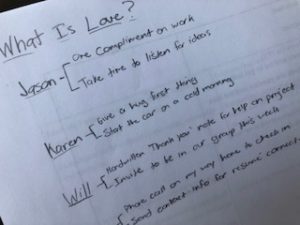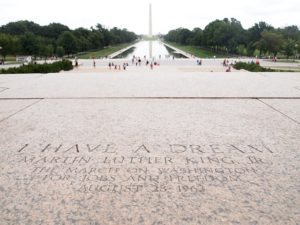4. Owning Collective Integrity
Owning Collective Integrity: Why Ownership of Your Integrity Needs a Team
I’ll be honest, this page has sat blank for quite a while because “integrity” might be one of the most used words in America and simultaneously one of the least understood. I’ve struggled to put pen to paper – or fingers to keyboard – with such a word. Popularly, integrity is defined as what you do when no one is looking. I get it. It seems simple enough. Even if no one will know, you should still do the right thing. Great. Check, please!
It’s not so simple though when we start to think of our real lives. Integrity gets complicated when we put the microscope on it. If we take a hard stance, integrity means that you do exactly the right thing all of the time, in all situations. It leaves us wondering though, can’t the “right” thing be a bit subjective? If no one is watching anyway then I get to make up my own definition of what is “right”. A quick look around our society and you’ll see the pervasiveness of this idea. Everyone defines what they think is right and lives their life accordingly without apology. That guy that cut you off on your commute today? He has decided that his work is more important so it’s just right of him to take the space.
This ambiguity is exactly why integrity has been included in the Brothers LIFE Council principles. We need a solid operational definition on which to stand together. Here is our creed of integrity:
We maintain our integrity by aligning our beliefs, words, and actions to take ownership of our lives in a society increasingly willing to pass blame.
Jocko Willink has made a second career – after 20 years with the Navy SEALS – of ownership. His first book, written with fellow SEAL Leif Babin, is titled “Extreme Ownership” (if you haven’t read it, go do so). They believe, “there is no one else to blame; you must own problems along with solutions…” This is what true integrity is. Whether someone is looking or not, you can’t pass the blame. You better take control of your life and decisions. To do that, your talk and your walk have to match up.
What is “right” aligns your beliefs, words, and actions toward taking ownership of an optimized life and a better world. Let’s add some nuance though. If you believe robbing someone on the street is right, so you talk about it, and then go do it is that acting with integrity since your belief is aligned with your action? No, it doesn’t lead to a better life for anyone. She loses her money, identity, and sense of safety and you lose your freedom when the police come knocking.
To maintain your integrity, you have to do something that may sound ridiculous in 2020. You have to think of other people first and yourself second. You have to be able to detach from your own life and see your actions as they impact the world around you. If they aren’t leaving a positive mark, you’re not even on the scale of integrity and your first job is to simply learn what it means to be a contributing member of the broader tribe the worry about aligning your actions with what you mature into.
Robbing someone is an easy example but day-to-day, integrity is more difficult to nail down. A few weeks back, I wanted to cancel on some plans my wife and I had made with friends over a month prior. When we planned it, it was so far off that I just said “yes” but as the day approached, I would have rather gotten a workout in and relaxed at home. In a strong moment of pity-party invitation, I called up a member of my LIFE Council with the hope that they would affirm my anguish of sticking to the plan. “Man, this dinner thing just sounds like too much right now. I feel bad but I just don’t want to do this one tonight. How could I get out if it?” What came back at me was not what I hoped. “Well, I don’t think you do. You made plans, canceling now would just be a lack of commitment. Just make it happen. Gotta run. Have fun!” Click.
Ever have that moment you kind of hate one of your friends because you know they’re right? The Brothers LIFE Council, with our common definition, is the accountability we need to maintain our integrity. In the moments we don’t want to apologize to our spouse for a dumb comment or we want to skip that workout when it’s cold outside, we have the other guys to remind us what our integrity means.
Do the right thing whether people are watching or not (let’s be honest, with technology we have, they’re watching). Find some other people who will have the courage to nudge you out of your excuses and build your collective integrity. With integrity intact, watch your relationships, career, and everything else get stronger and more fulfilling.
Your Challenge
This week is a two-fold challenge:
1. Make an integrity commitment for the week.
Identify one area of your life that you need to align your beliefs, words, and actions. Choose one piece of that area to work on this week. Write it on a sticky note and put it on your mirror, computer, or somewhere else you’ll see it every day to remind yourself. For example, if I need to better align my belief that I should save more than I spend, I might decide to only make coffee at home and not buy it. My sticky note might say “no coffee”
2. Identify one other guy to share your integrity commitment with.
Give them a call or send a text to let them know what you’re up to. It’s a bonus if they are involved enough to help check in on you. With the coffee example, choose someone you see in the morning at work or the gym so they can make sure that coffee cup is from home and not Starbucks. Of course, you could still cheat but you’d have to really go out of your integrity to, so be better.
Question of the Week
Where in your life do you get praise but in your own heart, know you could be living with more integrity?
4. Owning Collective Integrity Read More »






